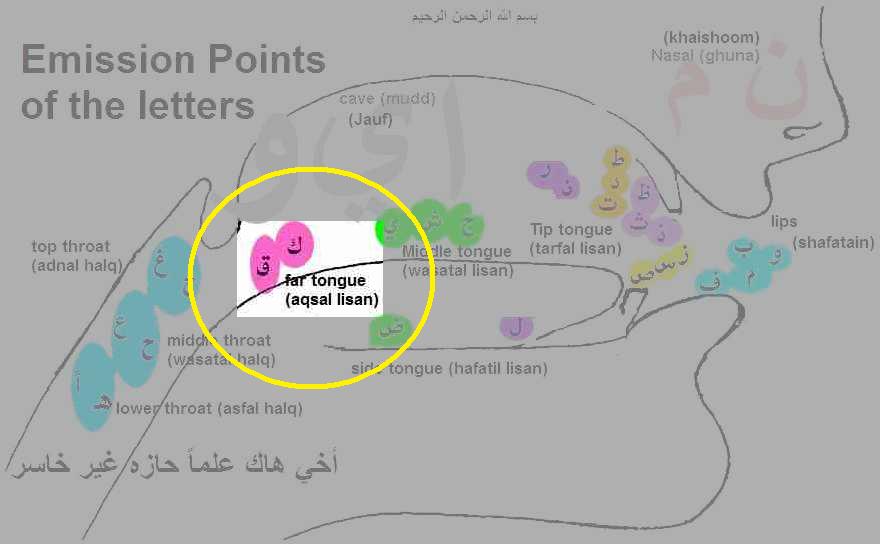
Far Tongue Letters
Salam alaikum wa rahmatu Allahi wa BarakatuHu.
Peace be upon the followers of guidance.
In this lesson we will go over the letters of the far tongue (Aqsal Lisan).

The letters of the tongue are divided into four sections:
1. The far tongue (aqsal lisan) .
2. The middle tongue (wasatal lisan)
3. The side tongue (Hafatul lisan)
4. The tip of the tongue (tarful lisan)
The far tongue (aqsal lisan) has two letters that emit from it ق (qaf) and
ك (Kaf). The ق (qaf) is a thick letter (mufakhama) and pronounced below the ك (Kaf) which is a thin letter (Muraqaqa).
ق
The ق (qaf) is a thick letter. The thick letters are :
خص ضغط قظ
When pronouncing the thick (mufakhma) letters, like ق (qaf), keep the side of of the mouth close together. When pronouncing thin (muraqaqa) letters like ك (Kaf) keep
the side of the mouth apart. The thick letters have a "o" sound, and the thin letters have an "a" sound. ق (qaf) sounds sort of like "cough". ك (Kaf) sounds sort of like "calf".
When reciting the Quran, it is very important to pronounce the ق (qaf) and ك (Kaf) the right way, otherwise the meaning would change drastically. For example:
قَلْبٌ which means "heart", and
كَلْبٌ which means "dog" .
It is good to practice, and recite to a shaikh so that one will become used to pronouncing the ق (qaf) and ك (Kaf) correctly. After a while, you will get used to it, and pronounce it correctly without even thinking about it.
The ق when it has a sakoon on it (قْ) is pronounced with qalqala. It sounds like there is a shadda, like there are two qafs, the first with sakoon, and the second with fatha (قْقَ), however the the second with fatha is not pronounced as long.
Listen to the following ayats of surah falaq, paying attention to the ق :
{قُلۡ أَعُوذُ بِرَبِّ ٱلۡفَلَقِ}
{مِن شَرِّ مَا خَلَقَ}
Did you notice how the ق was pronounced at the end? It sounds as if you are pronouncing it twice, called qalqala. Allah willing, in a future lesson we will explain more about qalqala. The ق is a "strong" letter, meaning that it is not
easy to extend the length of time in pronouncing it.
Here are some more examples of ق qaf:
{إِنَّ قَـٰرُونَ ڪَانَ مِن قَوۡمِ مُوسَى}
{قُلۡ أَعُوذُ بِرَبِّ ٱلۡفَلَقِ}
{وَمَآ أَدۡرَٮٰكَ مَا ٱلۡقَارِعَةُ}
{قٓۚ وَٱلۡقُرۡءَانِ ٱلۡمَجِيدِ}
{ٱلۡحَآقَّةُ}
ك
The ك (kaf) has the same sound as ق (qaf) except that it is
pronounced thin. The ك (Kaf) is a thin letter (Muraqaqa) and pronounced above the ق (qaf) is a thick letter (mufakhama). When pronouncing thin (muraqaqa) letters like ك (Kaf) keep the side of the mouth apart. The thick letters have a "o" sound, and the thin letters have an "a" sound. ق (qaf) sounds sort of like "cough". ك (Kaf) sounds sort of like "calf".
Listen to the following ayat from surah Qasas:
{إِنَّ قَـٰرُونَ ڪَانَ مِن قَوۡمِ مُوسَى}
The قَا in قَـٰرُونَ is pronounced thick, and the كَا in ڪَانَ is pronounced thin.
The thick letters have a "o" sound, and the thin letters have an "a" sound. ق (qaf) sounds sort of like "car". ك (Kaf) sounds sort of like "can".
When reciting the Quran, it is very important to pronounce the ك (Kaf) and the ق (qaf) the right way, otherwise the meaning would change drastically. For example:
كُلْ which means "eat", and
قُلْ which means "say" .
It is good to practice, and recite to a shaikh so that one will become used to pronouncing the ق (qaf) and ك (Kaf) correctly. After a while, you will get used to it, and pronounce it correctly without even thinking about it.
The ك when it has a sakoon on it (كْ) is pronounced with hums (اَلْهَمْس) . The letters of hums (اَلْهَمْس) are:
فحثه شخص سكت
The letters of (اَلْهَمْس) are pronounced with air coming out of the mouth. If you put
your hand in front of your mouth, you would feel some air come out as you pronounce it.
Listen to the following ayats from Surat nashrah, paying attention to the ك at
the end of the ayat:
{أَلَمۡ نَشۡرَحۡ لَكَ صَدۡرَكَ}
{وَوَضَعۡنَا عَنكَ وِزۡرَكَ}
{ٱلَّذِىٓ أَنقَضَ ظَهۡرَكَ}
Did you notice how the ك was pronounced at the end? You do not hear the sound
of qalqala like in the ق. Allah willing, in a future lesson we will explain more about qalqala.
Here are some more examples of ك kaf:
{إِنَّ قَـٰرُونَ ڪَانَ مِن قَوۡمِ مُوسَى}
{وَمَآ أَدۡرَٮٰكَ مَا ٱلۡقَارِعَةُ}
{أَلَمۡ نَشۡرَحۡ لَكَ صَدۡرَكَ}
{وَوَضَعۡنَا عَنكَ وِزۡرَكَ}
{قُلۡ يَـٰٓأَيُّہَا ٱلۡڪَـٰفِرُونَ}
{مَـٰلِكِ يَوۡمِ ٱلدِّينِ}


